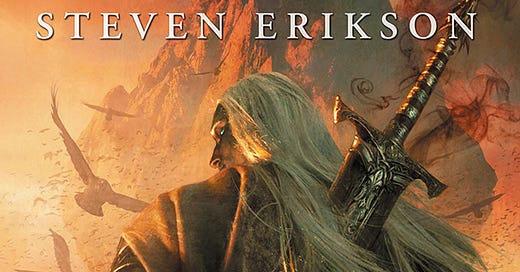I’ll be discussing Alomander Rake as seen in Garden’s of the Moon. There will be spoilers for the first few chapters, and some minor character spoilers for the book. If you intend to read the book, and don’t mind that minor spoilers, read on. If not, I’ll see you in the next post.
One of the coolest characters in the Malazan universe is Alomander Rake. We get introduced to him in the first book of Malazan Book of the Fallen. On the surface, he’s an instantly awesome character. He’s got a magic sword that binds souls, he’s been around for thousands, maybe tens of thousands, of years, and he’s written in such a way that you tell he’s got immense power. When he walks into a room, you know he’s there.
But Erikson doesn’t write him, at least in Gardens of the Moon, as lauding it over people (and I won’t tell you if he continues this way in subsequent volumes). This man possesses a godlike power (I mean, he can shapeshift into a dragon), and could easily abuse it. But he doesn’t. Not many people could be like this. Marcus Aurelius comes to mind…but who else?
And despite being well versed in war and combat, he does his best to diffuse situations. Rake is a skilled warrior, but you can tell he hates war. We see this immediately. Gardens of the Moon is largely about the Malazan’s conquest of the continent of Genabakis. Malazan is an expansionist empire, and there are two remaining free cities. We soon see a stalemate at the city of Pale. Rake is alone in his floating fortress, Moon Spawn, facing thousands of mages and soldiers. Even the best mages are terrified to engage. This instantly tells you how powerful he is.
Part of the genius of Erikson is subverting tropes. What we see with Rake is a man at the end of a typical journey where one starts off weak, and at the end is a bad ass. We don’t see his evolution. We just see the aftermath of thousands of years that made him feared.
Question. He’s helping Pale. Why not just vanquish the Malazan army? Erikson never says, but he’s great at indirect characterization. Often we need to read between the lines. Think a little about what we read. Two reasons why Rake wouldn’t want to engage. One, he’d win at the cost of thousands of lives. He knows he’ll win. And he knows the cost is thousands of deaths. Who wants that on their conscience? Even at this point, we can reasonably assume Rake has seen a lot of combat. He’s seen death. He knows viscerally the cost of war. His hope, I think, is his mere presence will lead to the Malazan’s backing down. I suspect Rake has experienced enough to know nobody really wins wars. It’s just death and destruction.
A second reason is by considering his sword. Anyone killed with the sword binds their soul, and denies them the afterlife. Now, in the hands of a tyrant, such a weapon is wielded with disregard. For Rake, he doesn’t view the weapon as a great thing. It’s a burden he carries. Who’d wish to bind people to eternal torment? Not Rake, so he’s very disinclined to use the sword. After all, who’d want that on their conscience?
Rake is clearly more powerful than most, second only to gods. But he never makes people feel inferior. He never talks down to people. He doesn’t bend them to his will. Rake relates to others as equals. How could you not like a guy such as him?
Rake is a fan favorite, and for good reason. It would be easy for him to walk into any situation sword swinging. But Rake isn’t a tyrant. But he’s far from a goodie-goodie. Erikson doesn’t write heroes. I won’t pretend Rake is a paragon of virtue, but however flawed Rake is, he views violence as a last resort. And why wouldn’t he? He’s seen that great things aren’t birthed from violence.
Gardens of the Moon has something like 33 POV characters. Rake is just one. Even in the few scenes he’s in, Erikson is able to write a three dimensional character in the span of a few paragraphs.



